Rugby 2022: Woeful Wallabies blow it again and no evidence things are changing
The excuses for two decades of mediocrity run the length of the playing field. So what can Rugby Australia do to resurrect the Wallabies and for that matter the game itself, asks Julian Linden.
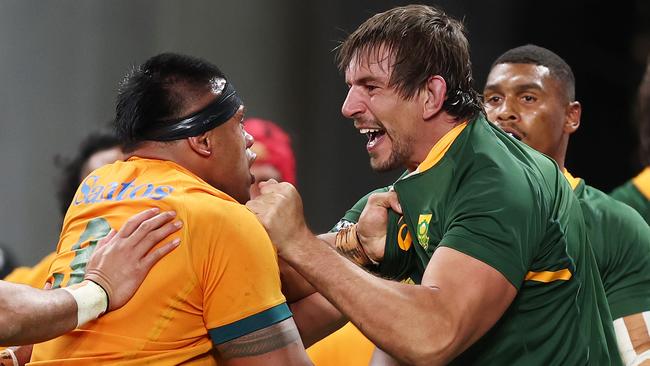
Rugby
Don't miss out on the headlines from Rugby. Followed categories will be added to My News.
A lot of theories are being tossed around about the demise of Australian rugby.
The most popular revolve around the idea the Wallabies’ failures are a direct result of the talent drain to other, wealthier football codes.
Others blame the sport’s administrators for all their goofy mistakes over the years.
Others yet blame the global pandemic, or the softening up of the laws, or the irritating stoppages that have turned the game into a yawn fest.
But there’s another theory that hasn’t been given a lot of serious thought — but really should — maybe the Wobblies just aren’t up to it.
Stream Over 50 Sports Live & On-Demand with Kayo. New to Kayo? Start your free trial now >
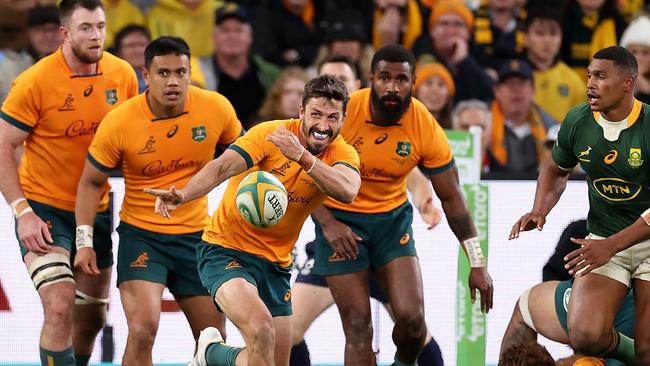
Like the tale about the emperor and his invisible new clothes, the woeful Wallabies have deluded almost everyone into believing they are among the world’s best teams when all the evidence says otherwise.
Everyone knows it’s been over two decades since the glory days when the Wallabies last held the World Cup and the Bledisloe Cup but the most worrying trend has been the unchecked free fall in recent seasons.
Over the last seven years, the Wallabies have played 79 Tests, winning 34 — or 43%. Against Tier 1 nations, the winning strike rate drops to 34%.
This season alone, the Wallabies lost a series at home to England, suffered a record loss to Argentina and just lost their first match at home to South Africa since 2013 when they went down 24-8 in an error-strewn forgetful opening match at Allianz Stadium.
Despite what they and their bootlickers say, there is no evidence the Wallabies are getting better. If anything, their results are just getting worse — a lot worse — and it’s time someone reminded the emperor that he’s stark naked.
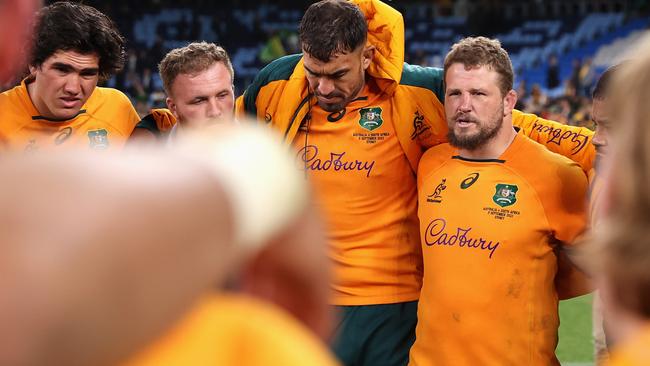
Since Rennie took over from Michael Cheika three years ago, the Wallabies have won just 11 of 27 matches (41%) and remain winless in Sydney, rugby’s biggest commercial market.
Rennie is loyal to his players so won’t ever say anything against his troops, but the blunt reality is the New Zealander’s biggest problem is he doesn’t have the right cattle and no amount of tinkering with the line-ups or the Giteau Law will fix that.
With two matches against the All Blacks coming up, the rest of this month could be carnage with Rennie facing every coach’s perennial nightmare; to wield the axe (again) or keep faith with the same players who just got flogged.
With several more players already in doubt because of injuries, including Noah Lolesio and Hunter Paisami, Rennie may have no choice but to make more changes — and hope for a miracle turnaround.
“Obviously there‘s key areas where we’ve got to be better,” he said.
“We‘ll reassess, we’ll pick another squad from an All Black campaign point of view.”
Consistency — or lack of — has been the lazy buzzword to explain the Wallabies’ woes but Rugby Australia officials need to share the blame because it’s time for some radical rethinking to break from the cycle.
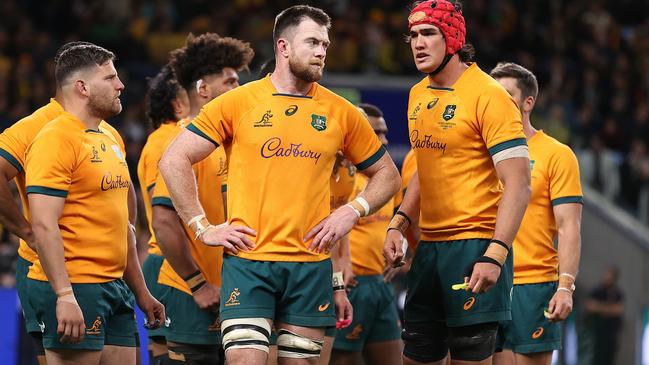
The obvious, quick fix solution is to recruit from the NRL ranks but that comes with a hefty price tag which the 15-player code can’t afford at the moment because it is broke.
The longer term strategy of developing players through Super Rugby is fine in theory but doesn’t actually work in practice because the Kiwis just keep belting the confidence out of them in a competition that has completely lost all its appeal.
Super Rugby was a great concept when it started but that’s a long time ago now and it’s become an albatross around the game’s neck so Rugby Australia needs to be bold enough to do what it should have done years ago and set up its own national competition.
And while they’re at it, they also need to blow up the Rugby Championship and start all over again because it has also become boring and stale.
It is no wonder the South Africans are ditching the southern hemisphere and heading to Europe because that’s now the powerbase of world rugby.
The model and format of Europe’s competitions — both at international and club level — are light years ahead of what’s happening south of the Equator, whose dominance of World Cups has created an arrogant, false sense of superiority that’s about to change.
The dismal performances by the southern hemisphere nations in the past two years is that unless something changes soon, a European team will win next year’s World Cup and the Wallabies will be just making up the numbers.
Ugly truth: Sloppy Wallabies blow golden chance
NRL boss Peter V’landys was half right with his cheeky jibes about rugby union this week.
V’landys’ claim that rugby is a boring game was a juvenile comment shown to be way off the mark, though not for the reasons he proposed.
Beauty, it has long been said, is in the eye of the beholder, but for pure entertainment value, Saturday’s humiliating 24-8 loss by the Wallabies against South Africa had as much going for it as the NRL’s electric opening fixture at Allianz Stadium between the Roosters and Rabbitohs.
That was partly because Saturday’s Rugby Championship match was strewn with so many sloppy errors that it should have been classified as an adults-only comedy packed with X-rated bloopers.
It was ugly but anything but boring. There was even a bit of old-fashioned biff, though the powder puff punches were so soft they wouldn’t have bruised a grape.
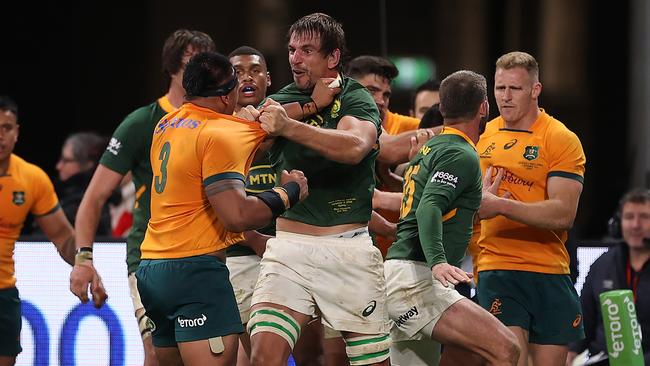
The Wallabies’ skipper James Slipper was so embarrassed he gathered his players on the field after the whistle and told them to remember what failure feels like.
“As you can imagine, (we’re) pretty disappointed,” Slipper said.
“I made a point after the game that this one has to hurt a lot. I want the boys to hurt because, yes South Africa were good, but I just felt like we didn’t really play much rugby at all.”
What V’landys did get right, though, is that rugby really is hard to watch.
The pedantic referring and constant stoppages are killing the game but spare a thought for the Wallabies’ long-suffering supporters because this is testing their patience.
Once the pride of the nation, the Wallabies have descended into a modern-day version of the sideshow alley act, slightly amusing but mostly harmless.
Saturday’s clash with the world champion Springboks was another case in hand.
It was meant to be Australian rugby’s coming out party but it ended with another all-too familiar loss in the game’s traditional heartland.
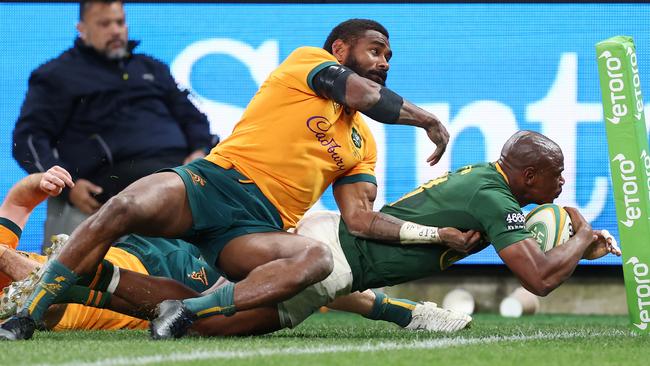
The biggest surprise was that no one was surprised because the Wallabies haven’t won a Test in NSW against a Tier 1 nation since 2015.
For all their huff and puff about being a team on the rise, the Wallabies still can’t win the games that matter.
They haven’t won a World Cup since 1999 and haven’t held the Bledisloe Cup for two decades. With their next two matches against the All Blacks coming up later this month, it would take a monumental turnaround for that to turn around.
Beating the Springboks isn’t in the same league but Saturday’s match was still an important fixture because it was the first at the new Allianz Stadium so the stands were packed with the game’s faithful.
It was a chance for Dave Rennie’s struggling team to prove they can string a few wins together — which they will need to if they want to be a genuine contender at next year’s World Cup in France.
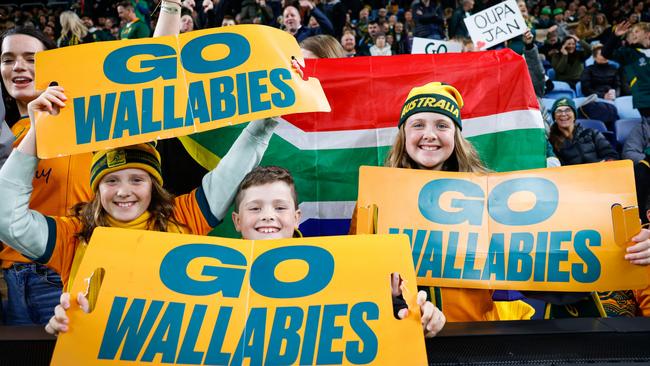
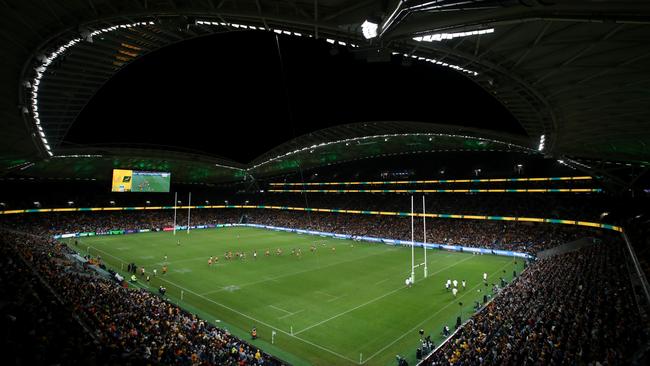
By their own admission, last week’s impressive win over the Springboks in Adelaide would count for nothing if they didn’t back it up by winning in Sydney but while they talked a good game, they didn’t play one.
“I don’t know about one forward, two back, but as I’ve said before, it’s a tough competition,” Rennie said. “You’ve got to be at your best every week to be in with a sniff and clearly that’s been a big part of our mantra.
“We have an understanding we’re playing for something bigger than ourselves. There’s no shortage of motivation in this group and there’s no shortage of motivation and there’s no shortage of belief but we’ve got to win those key moments and we’ve got to do the basics a hell of a lot better.”
The Springboks hadn’t won a Test against the Wallabies in Australia since 2013 but they had this one in the bag almost from the opening kick off as they beat their opponents first with brawn then with brains.
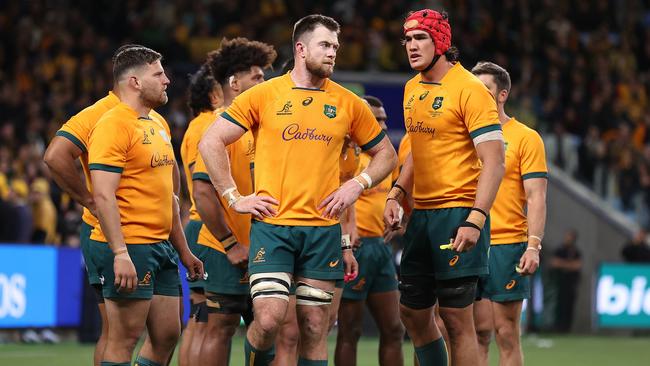
The South Africans scored four tries, with the first coming after just 10 minutes, to secure a bonus point, which could be critical in deciding the championship. With two rounds to go, New Zealand lead the three other teams by just one point.
“I just wanted the boys to realise how much it hurts and hold on to that and let that drive you into the future,” Slipper said.
“We can be disappointed for a day or two, but at the end of the day we’ve got the All Blacks coming up and in two weeks and if you’re still kicking cans around at that time, then that’s not going to help anyone.
“So I want it to hurt but at the same time I want to be better, we’ve got to be better. And that’s what I just put the challenge to the group essentially.”
The visitors turned down the chance to kick for goal when they began pounding the Australian line and they were rewarded when Damian de Allende dived over under the sticks.
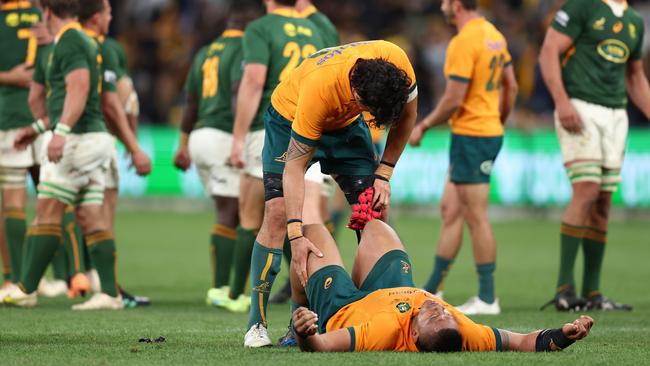
The Wallabies cut the margin to 7-3 when Noah Lolesio banged over a penalty just before the break but the Springboks got another five-pointer before the interval when teenage sensation Canan Moodie leapt into the air above a flat-footed Marike Koroibete to regather a box kick from Jaden Hendrikse and scored unopposed.
Up 12-3 at the change if ends, the Boks rammed home their advantage in the second half, when Franco Mostert scored in the right corner just after the restart then Makazola Mapimpi dived over in the left corner eight minutes from the end then was sin binned for sparking a brawl.
The Wallabies got a consolation try in the last minute to replacement backrower Pete Samu but it was too little too late.
“Credit to them, they showed why they’re world champs,” Wallabies halfback Nic White said.
“Physically, I think they were just better than us. Defensively, double-teaming our men, slowing the breakdown. It’s disappointing, a great crowd turned out here tonight and we weren’t able to get into it.
“We’ll go back to the drawing board, we’ve got the two biggest games of our year coming up. We’re down to Melbourne, hopefully we can get away to a good start there and throw the kitchen sink at that.”





